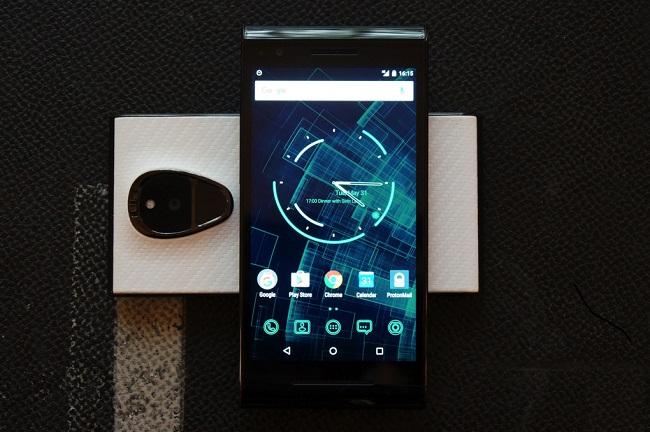Sirin Labs announced a smartphone and PC on the blockchain

Smartphones Finney Sirin Labs
The Israeli company Sirin Labs, which released last year the $ 14,000 Solarin smartphone, protected from hacking, unveiled a new line of Finney blockchain-based devices with open source. The series, named after the well-known cryptographer and bitcoin pioneer Hal Finney, will include a smartphone and a PC designed for storing the cryptocurrency.
In fact, the new smartphone is the same Solarin with a new design and filling designed specifically for the crypto terminal. Both devices will operate in an independent blockchain network based on IOTA's Tangle technology. The network will operate independently of centralized core networks or mining centers that slow down the transaction process, using the SRN token as the default currency.
')

Finney predecessor - Solarin
The Android-based Shield OS operating system will receive a highly secure cryptographic core capable of supporting multiple cryptocurrency wallets, secure transaction services and a decentralized application store, as well as the sharing of device resources on a P2P network.
About the technical characteristics of the computer is not very much known: it is a monoblock with a 2K-screen with a diagonal of 24 inches, 256 GB of internal memory and 8 GB of RAM. Support for biometric security and wireless input devices will be implemented.

Finney smartphone and PC
The smartphone with a 5.2-inch QHD-display will have 8 GB of RAM, the main 16 MP camera, a 12-megapixel wide-angle front camera and an impressive package of cyber security tools, which partially migrated from the previous design of Sirin Labs - Solarin.
Based on the analysis of user behavior, the intrusion prevention system, three-factor authentication, encrypted communication, and the blockchain-based protection function against unauthorized modifications in theory mean that hacking the phone will require some effort. But how much such a device does the market need?
The crypto community is still a narrow niche compared to the segment Solarin was designed for. But even here, things did not go as smoothly as they wanted - just 10 months after launching the device into the market, the company laid off a third of its employees, declaring reorganization and reorientation to new markets. A year after the launch of the smartphone, Solarin Sirin Labs registered sales of only $ 10 million.
As Sirin Labs announced at the presentation in 2016, the main advantage of Solarin over other Android smartphones, which was to justify the price tag, was an advanced security system. The model works on Zimperium software, which protects against hacker attacks, and the KoolSpan chip, which encrypts voice and text messages. This smartphone also has a special switch on the back panel that puts it in advanced cybersecurity mode, allowing you to make outgoing voice calls only and send encrypted messages.
Finney's predecessor runs the Snapdragon 810 chip and features 4 GB of RAM, a 23.8 megapixel main camera and a 5.5-inch IPS display.
Unlike Solarin, which cost was 14 thousand US dollars, the price for the Finney line will start from 999 dollars for a smartphone and 799 dollars for a PC. But the company said that only owners of SRN tokens will be able to purchase Finney devices and services. The entire line will be available for purchase in 2018.
Sirin Labs is a company founded in 2013 by Kenes Rakishev, an entrepreneur from Kazakhstan, Moshe Hogeg, an Israeli venture capitalist, and Tal Cohen, a former McKinsey consultant. They spent 2 years and 72 million dollars on the creation of the first premium Solarin smartphone. To develop Finney, they will need to collect a little less - about $ 50 million for a smartphone and $ 25 million for a PC. To do this, they plan to release a new cryptocurrency and sell part of it to investors in exchange for holding an ICO or other cryptocurrency, for example, Bitcoins.
Source: https://habr.com/ru/post/373849/
All Articles